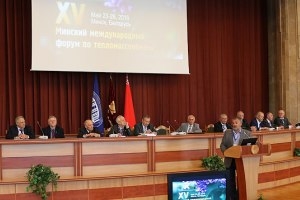Ru
|
Eng
Over 250 scientists from ten countries taking part in mass, heat transfer forum in Minsk
23.05.2016

Over 250 leading scientists from ten countries are taking part in the 15th international forum on heat and mass transfer in Minsk. The forum was opened in the National Academy of Sciences of Belarus on 23 May, BelTA has learned.
Oleg Penyazkov, Director of the A.V. Lykov Heat and Mass Transfer Institute of the National Academy of Sciences of Belarus, told media that the items on the agenda of the forum are directly related to problem solving in the power engineering industry, space industry, and the description of complicated natural processes. For instance, as far as the space industry is concerned, the international scientific community will have to address problems relating to the changing temperature of the surface of spacecraft. “When a spacecraft is being returned to the Earth’s surface, it enters the atmosphere at a very high speed, with the spacecraft’s surface getting heated to a thousand degrees Celsius and more. Special materials need to be created in order to deliver equipment and people, in order to keep the spacecraft safe. It takes a lot of work,” said Oleg Penyazkov.
Another purpose of the forum is to evaluate the possibilities for commercial R&D products that may be created in partnership with scientists from ex-USSR countries.
The Minsk mass and heat transfer forum gathered scientists from Russia, the USA, China, Japan, the UK, Germany, Norway, Poland, and other countries. The program of the forum includes 375 reports by scientists in various areas such as biology, space technologies, heat transfer problems in technological systems, biological and medical researches where heat and mass transfer plays a major role for diagnostic and therapeutic purposes.
The forum has been held in Minsk every four years since the early 1960s. It is a token of recognition of accomplishments of the Belarusian school of thought in the area of mass and heat transfer. The forum also offers an opportunity for specialists to share ideas, compare notes, find partners to expand scientific inquiry horizons, find investors and potential manufacturers of science-intensive products.
The forum on heat and mass transfer in Minsk will stay open through 26 May.
SCIENCE. TECHNOLOGY. INNOVATIONS
13.08.2024
28.06.2024
28.06.2024
25.06.2024
05.06.2024
15.05.2024
15.05.2024
26.04.2024
26.04.2024
26.04.2024













